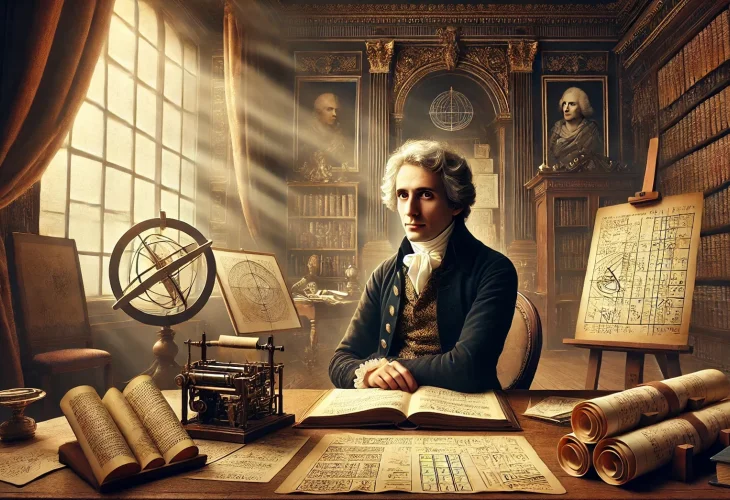In the Name of Science: Loyalty to Truth or Personal Interests?
The Marquis de Laplace didn't dabble in gender studies or such subjects, where anyone could become a professor. He specialized in precise science. Yet, despite his focus, he was known to change colors like a chameleon, supporting those who best served his interests, all under the banner of science and probability.

The Marquis Pierre-Simon de Laplace was one of France's brilliant minds, and indeed one of the brightest of all times. His mathematical equations are still in use today, and his probability calculations marked a historic breakthrough.
In 1784, Louis XVI appointed Laplace as the supervisor of the royal artillery. Although artillery today is associated with advanced science, in the 18th century it primarily involved a few types of cannons aimed based on visual experience. Nonetheless, it was a well-paying position.
Laplace, unaware that Louis XVI's reign was nearing its end, approached the guillotine one day at a time. In 1789, the French Revolution erupted. King Louis lost his head, and the famous chemist Antoine Lavoisier, to whom modern science owes much, also met his end at the guillotine. He served King Louis, and "the Republic has no need for geniuses," declared the judge in a swift trial where barely a few hours separated accusation and execution. Mathematicians of that era noted, "That head took a second to drop, but a hundred years won't produce another like it."
Laplace was slightly more astute, and immediately after the revolution, he declared his "burning hatred for the monarchy." It appears this declaration was the primary reason his head remained intact. During the revolution, Laplace metaphorically kept a low profile and focused on his tables. However, with the ascension of the enlightened dictator Napoleon to power a decade later, Laplace began showing significant respect for Napoleon's military strategies and published an enthusiastic scientific opinion on Napoleon's virtues... Napoleon, in turn, rewarded him with interior office and the title of count. Napoleon, who saw himself as an enlightened man, enjoyed surrounding himself with scientists and scholars.
In 1807, when the French army advanced towards the German city of Göttingen, while the zealous French soldiers began their siege, a note from the supreme commander was delivered to the front lines: "Do not attack Göttingen, for it is home to the greatest mathematician of all time," referring to Friedrich Gauss, whose "bell" is a staple in statistical research to this day.
While they refrained from destruction, as was traditional in Europe, a need for money arose at some point during the war. Following well-established practice, this need was imposed on the war's losers in the form of a "fine," a euphemism for ancient war looting. The fine was based on income, or at least on estimations that appeared such, resulting in the imposition of a massive fine of 2000 francs on the great mathematician Gauss. Laplace, realizing where his bread was buttered, volunteered to pay the fine for the sake of science.
Laplace dedicated his famous essay "Analytical Theory of Probabilities" to "the great Napoleon." Alas, by then, Napoleon was drunk on power, and his patience for mathematicians had waned... Not long after, he dismissed Laplace, claiming he was tedious and petty...
The wheel of fortune turns, the science of probability progresses, and in 1814, Laplace opened his essay with a discussion entitled: "The fall of empires seeking global dominion can be predicted with high certainty by those versed in calculating odds." Translation: Napoleon thinks he holds power, but no, the power is in the hands of scientists. When he charges into battle with his soldiers, they can now calculate the odds of his imminent defeat. Our mathematician bet on the right side. Prediction is everything.
Louis XVIII, who ascended the throne after Napoleon's downfall, acknowledged the scientific achievements of Count de Laplace and granted him the title of Marquis...
So, the Marquis de Laplace didn't engage in frivolous studies where any mad person could become a professor. He delved into precise science. His calculations largely remain relevant to modern science, providing foundational and profound material rooted in mathematical equations. He did not play games there.
Yet still, he was capable of acting like a chameleon, supporting those who were profitable to support in the name of science and probability. Somehow, he managed to connect this to the theory of probability, of which he was a key developer.
The circle of French enlightenment later contributed "The Treason of the Intellectuals" by Julien Benda, published between the two World Wars. Benda laments the constant involvement of intellectuals in politics. Instead of remaining in pursuit of truth, which contradicts taking political stances and the desire to empower a group or party, they sell their wisdom to politics.
Since then, much water has flowed through the Seine. Enlightenment, scientists in the name of science, and intellectuals, in general, have turned their political opinions into one of the branches of exact science. All the injustices, atrocities, and absurdities committed by the regime they favored received a scientific veneer. In communist Russia, in Nazi Germany, and even in the modern Western world, from Israel to the USA, "legal" opinions from one side of the map perpetrate injustice, lack of fairness, and primarily: impose personal views of their owners under the guise of professionalism, law, research, science, etc.
It's worth remembering this every time you read a headline about a professor releasing a new study proclaiming what is written in the Torah or by the sages is "just a legend" and so on. Don't mix their opinions in the name of science and research.

